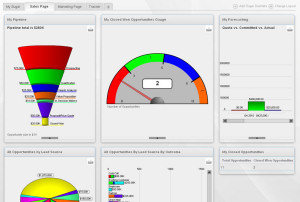Sales KPI - key performance indicators for sales, provide a timely warning.
Overall sales performance data are no help for understanding the reasons underlying success or failure. Sales KPI measurements provide an instant indication that allows rapid reaction.
As soon as key performance indicators show a negative divergence from expectations, salespeople and organisations can take corrective action.
In addition to providing an early warning of shortfalls, measurement data identifies development and improvement opportunities.
Everyone is motivated to some degree to beat a personal best. Peer pressure has long been recognised as a powerful motivator. Publishing sales performance benchmarking data leverages peer pressure and impacts behaviour.
Collecting comparable public data on the performance of competitors provides an instant benchmark for comparison with market norms and sets a bar for the best performers.
Task-level indicators can encompass any criteria that mark progress towards goals.
Example Sales KPIs include:
- The total number of customer contacts by day or week.
- The number of inbound customer telephone calls dealt with.
- The number of outbound customer telephone calls made.
- The number of emails sent to customers.
- Call duration as a measure of meeting time in a virtual conference environment.
- Face-to-face meeting time.
- Proposal or quotation success ratios.
- The total value of identified pipeline opportunities.
- Lead-to-sale conversion ratios.
- Opportunity to sales conversion ratios.
- Conversion ratios by sales process stage.
- The number of new logo customers won.
- The average customer value by salesperson.
You might expect a general correlation between work rate and results. Sales KPI measurement will provide the facts. Whether or not results correspond to work rate, the measurements will provide invaluable information about the most effective habits and practices.
The analysis will show relative productivity as well as which salespeople are most active. Publishing the results creates immediate interest. People like to be measured when the measurement is factual and non-judgemental.
Make Key Performance Indicators Public
Performers will naturally want to demonstrate superiority and will compete to score ahead of their peers. Regular contributors will pay more attention to whatever is being measured. Poor performers will seek to demonstrate their credibility by changing their behaviour.
Collect and publish the sales KPI data weekly to maintain the effect.
If you want to change behaviour, change or expand the focus of measurement.
Once you have established the means of collecting and presenting an array of key performance indicators, you will have a new set of controls that influence behaviour without relying on management skills, monetary incentives, or policy declarations.
Sales Performance Appraisal
Use sales KPI to provide motivating appraisals. So many salespeople complain that they are not given appraisals. Many managers hate giving appraisals yet if done well, an appraisal can be an effective means of raising motivation, morale, and effort.
Give a motivating appraisal by simply collecting KPI data, sharing it with the person being appraised, confirming the validity of the data, and asking for comments.
Simply ask, what people think about the trends revealed by the KPI data collected and what they think they can do to change or improve the trends.
If the manager refrains from criticism, an open discussion ensues.
Use KPI to Influence Behaviour
Emphasising or de-emphasising particular measurements provides a means of influencing preferred behaviours. Individual salespeople can use the same principles to influence their own behaviour and to achieve more of what they set out to.
The ingredients are:
- Measurement of the desired behaviour.
- Comparison with respected peers.
- Comparison with industry or market norms.
The process involves collecting historical data, setting up a monitoring system, and analysing the results. It is hard to deliberately lose weight without a set of scales.
While it is easy to identify measurable parameters, it is much more challenging to set up a system to capture and publish the results consistently. There is an overhead to leveraging this overlooked means of improving results. New monitoring and reporting processes need to be established and maintained.
Obtaining internal records is much easier than acquiring comparable market figures. Some metrics for competitors can be derived from public information sources however, most depend on obtaining cooperation via a third party or a sales performance benchmarking alliance.
Overcoming the Obstacles
Despite the obvious advantages of benchmarking and the years of management training advocating measurement, many organisations find it hard to implement stronger KPI disciplines. Even when the benefits are recognised and there is the collective will to take advantage of these principles; even when all the actions necessary to collect and publish the data are clear, projects falter.
It seems that day-to-day priorities push aside such projects and undermine resolve.
An outside party, temporary employee, contractor, or consultant may be necessary to give benchmarking the impetus required for it to succeed.
Return on the investment in the form of increased sales results arises from the intelligent direction of resources. There is no need for manipulation of monetary incentives. Monitoring key performance indicators is an under-utilised means of providing motivation, raising the bar, improving or changing behaviour, and improving the selling process.
These tools have the power to harness everyone’s will and cause it to be focused in the same direction. Key performance indicators are an essential element of effective sales management.
As the saying goes, “If you can't measure it, you can't manage it. Measure sales KPI to manage sales performance.
Article by Clive Miller
If you need to set up sales KPI benchmarking or develop key performance indicators for sales, we can help. Telephone +44 (0)1392 851500. We will be pleased to discuss your needs or talk through some options. Alternatively, Send an email to custserv@salessense.co.uk for a prompt reply or use the contact form here.













